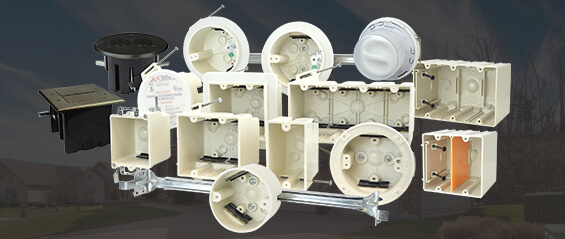
Plastic electrical boxes are available in different materials including PVC and ABS plastic. But, plastic boxes constructed of polycarbonate or fiberglass are superior for their durability, lightweight, and higher melting points. And when it comes to installation, these plastic electrical boxes have many advantages over traditional metal boxes.
Not only are polycarbonate and fiberglass electrical boxes lighter in weight when compared to metal, but they also cost less and are easier to work with – especially for residential applications and DIY electrical projects.
Why Plastic Electrical Boxes are Easier to Install
Quick and easy knockout holes
Often electrical boxes require punching out holes for wire and cable management. For metal boxes, these knockouts may require tools to remove the stamped knockout position, then the metal must be twisted and pulled to remove the metal plug. With plastic boxes, the knockout holes in the back and sides are much easier to punch out
Simply use a flat-head screwdriver to knock out the hole you will be using and remove the rest of the plastic material by hand if necessary. Metal boxes require special clamps to be used with the knockout. The clamp is necessary to make sure the wires do not rub against the sharp edges of the metal.
And if you have to add a hole to a plastic electrical box, you only need a sharp knife to first score the edges of your desired hole location. Then cut deeper and deeper into the plastic until you can push the material out.
Easier stud wall mounting
First, most plastic electrical boxes come with pre-measured tabs along the sides. This allows for more accurate positioning of the plastic electrical box on the stud wall so that it will be flush with the finished drywall.
Also, most plastic boxes are manufactured with pre-attached nails for nailing into studs or metal brackets that attach to the studs. And some plastic electrical boxes will have built-in clamps for securing a cable.
Compare this to metal electrical boxes that are more difficult to work and the sharp edges of the metal box can cut into hands and exposed wires. Plastic electrical boxes are so popular that their metal equivalents are only used when installing armored BX cable or routing metal conduit to and from the box.
Plastic electrical boxes don’t need grounding
Since fiberglass electrical boxes and polycarbonate electrical boxes are both made from a non-conductive material, you don’t need to worry about switches or receptacles shorting out if they touch the box sides. Therefore, these boxes generally do not require grounding.
Metal boxes must be grounded using a short wire called a pigtail to connect the box to the circuit’s ground wire(s).
Plastic electric boxes are the preferred choice
For new work, electrical contractors are preferring plastic electrical boxes over metal boxes. Especially when using Romex cable. And for do-it-yourselfers, plastic electrical boxes are preferred because they are lightweight, do not have sharp edges, and with the pre-tapped screw holes that are integrated within the box frame. This makes attaching devices such as receptacles and switches much easier
Visit Allied Moulded Products Inc. online for a complete selection of residential electrical boxes constructed of lightweight polycarbonate or super-tough fiberglass.





